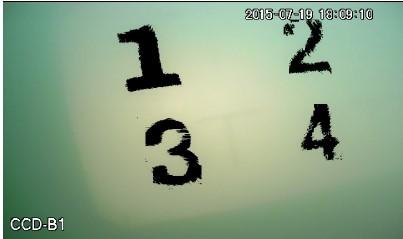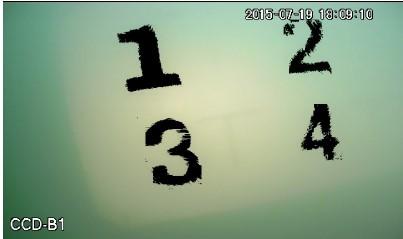
Credit:
WASHINGTON — Mankind has long been peering into the depths of the sea. From finding fish to avoiding rocks, the ability to see as far as possible through turbid water has been important for thousands of years. More recently, scientists are using sophisticated cameras to study sea floor geology and deep-sea animal behaviors but are continually challenged to get a clear picture of the remote fathoms of the ocean.
Now, a team of researchers from Ocean University of China in Qingdao, China, may have helped improve the quality of underwater visualizations. In a novel methodology for improving underwater viewing, they applied a mathematical approach known as logical stochastic resonance (LSR). When applied to poor-quality underwater images, the LSR algorithms improved the team's ability to visually detect objects. The results of their investigation are published in the journal Optics Letters, from The Optical Society.
In the past, LSR was mainly limited to theoretical research. The current study extends and applies LSR to practical problems of detecting objects in a highly scattering medium, like turbid seawater.
"Our work is an interesting trial to apply LSR to process a degraded image produced by underwater imaging through a turbid medium. It is a helpful advance because inherent noise and nonlinearity cause difficulty in processing these images through conventional image processing methods," explained Nan Wang, of the College of Information Science & Engineering and lead author of the study. Their novel method for applying LSR to a visual problem demonstrates the effectiveness of their algorithm in extracting information that aids object detection in a heavily noisy background.
LSR is a somewhat counter-intuitive concept. The basic idea is to mix broadband noise with a noise-degraded signal in a non-linear medium to enhance signal frequency components over the background noise –a kind of constructive interference process that can produce increased clarity from within a muddle of noisy inputs.
LSR is more commonly considered in relation to noise and voltage fluctuations in non-linear electronic systems. In electronics, for example, LSR can be used to resolve multiple dynamic systems and create a productive – or "logical" – interplay that can be tuned and modulated. This can result in a controlled current and more energy-efficient electronics.
In the current study, researchers adapted the LSR approach to the problem of "visual noise" that degrades the quality of conventional image processing. In this case the noise is due to suspended particles in the water which causes variations in the absorption and scattering of light, a common state of most water in nature, especially seawater.
The LSR experiment required several steps. First, researchers obtained a heavily degraded, noisy underwater image. Next, they placed it in the LSR system as an input signal. They then input additional noise to counter the inherent noise — think of it as the constructive interference step because it helped separate objects in the image from the background. The process produced improved object detection by indicating whether a pixel belonged to the object or the background.
"Results in the natural offshore area demonstrate the effect of LSR in image processing, and the proposed method creates an interesting effect in the processing of heavily degraded images," Wang said. Final color correction and contrast enhancement algorithms, such as white balance and histogram equalization, can be used to produce a visually pleasing image, he added.
Wang and his colleagues conducted their experiments in Jiaozhou Bay in Northeast China. During the study, they battled high seas for several days on board a ship making the work difficult. "The big waves made a lot of trouble for us in trying to capture useful images," Wang said. Despite the difficulty, the researchers are eager to validate the work, refine it and extend its applications toward overcoming obstacles of seeing underwater.
###
Paper: B. Zheng, N. Wang, H. Zheng, Y. Zhinbin and J. Wang. Tripathi, Y. Chinifooroshan, W. Bock and P. Mikulic, "Object Extraction from Underwater Image through Logical Stochastic Resonance," Opt. Lett. 41, 4967-4970. DOI: 10.1364/OL.41.004967.
About Optics Letters
Optics Letters offers rapid dissemination of new results in all areas of optics with short, original, peer-reviewed communications. Optics Letters covers the latest research in optical science, including optical measurements, optical components and devices, atmospheric optics, biomedical optics, Fourier optics, integrated optics, optical processing, optoelectronics, lasers, nonlinear optics, optical storage and holography, optical coherence, polarization, quantum electronics, ultrafast optical phenomena, photonic crystals and fiber optics.
About The Optical Society
Founded in 1916, The Optical Society (OSA) is the leading professional organization for scientists, engineers, students and entrepreneurs who fuel discoveries, shape real-life applications and accelerate achievements in the science of light. Through world-renowned publications, meetings and membership initiatives, OSA provides quality research, inspired interactions and dedicated resources for its extensive global network of optics and photonics experts. For more information, visit osa.org/100.
Media Contact
Rebecca Andersen
[email protected]
202-321-5488
@opticalsociety
http://www.osa.org





